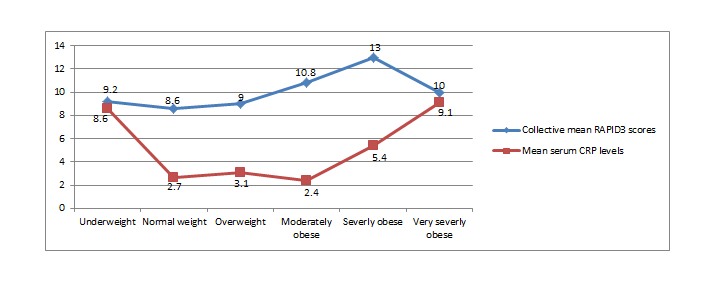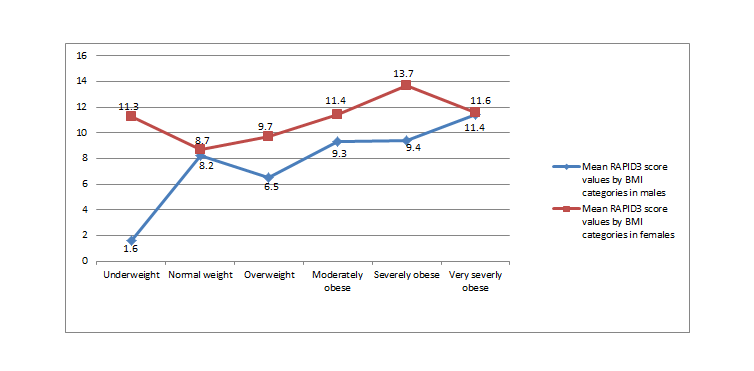Session Information
Date: Sunday, November 10, 2019
Title: RA – Diagnosis, Manifestations, & Outcomes Poster I: Risk Factors, Predictors, & Prognosis
Session Type: Poster Session (Sunday)
Session Time: 9:00AM-11:00AM
Background/Purpose: Current literature evaluating the effect of high Body Mass Index (BMI) on the disease activity of patients with rheumatoid arthritis (RA) is mixed as some studies have shown a positive, linear relationship between BMI and disease activity while others have demonstrated an inverse correlation. Through this study we have expanded upon the relationship between BMI and disease activity in RA. We have further expanded on whether BMI has an effect on the disease activity depending on the gender being studied. Finally, we have studied whether there is a correlation between high BMI values and rising C- reactive protein (CRP) levels.
Methods: This observational study was conducted at the outpatient clinical department of Buffalo Rheumatology and Medicine. The study was ethically approved by Catholic Health Institutional Review Board. The minimum sample size (n=358) was calculated via the World Health Organization sample size calculator. A total number of 451 patients’ clinical data was selected on the basis of inclusion/exclusion criteria. The patients were divided into different BMI categories based on the guidelines of National Obesity Education Initiative of the National Heart, Lung, and Blood Institute. The following clinical parameters were studied: BMI, serum CRP level, and severity of disease activity assessed through Routine Assessment of Patient Index Data questionnaire (RAPID3). All data was entered and analyzed through SPSS 16.0.
Results: Our study sample included 98 males and 353 females (22% and 78% respectively). The baseline data of the recruited patients is shown in table 1. Collective data for both the genders showed significantly increased disease activity in RA patients with high BMI values (p=0.04); the highest disease activity was observed in a subgroup of severely obese patients (mean RAPID3 score 13.0 + 7.3 SD) (image 1). When the data sets were categorized according to the two genders, it was noted that the aforementioned results remain significant for the females only (p=0.02 for females and p=0.57 for males). At all BMI values, mean RAPID3 scoring remained significantly higher for females as opposed to their male counterparts (p=0.006) (image 2). Among all three components of the RAPID3 questionnaire, the pain was recorded at the higher side of the scale as stated by the patients. Mean serum CRP levels increased linearly with increasing BMI (p< 0.001); however for the underweight patient population, mean CRP levels were the highest as compared to normal weight, overweight, moderately obese, and severely obese patients (image 1)
Conclusion: We conclude that the association between the BMI and the severity of disease remains elusive. High BMI values increases the risk for a pro-inflammatory state of the body due to higher serum CRP levels. Estimating the clinically significant benefit of this theory would require a large scale clinical trial that would highlight the role of losing weight in improving the patients’ quality of life, pain control, and mortality.
Foot notes: BMI= Body Mass Index; RAPID3= Routine Assessment of Patient Index Data; CRP= C Reactive Protein; p value= Pearson’s chi-square probability.
Foot notes: BMI= Body Mass Index; RAPID3= Routine Assessment of Patient Index Data; CRP= C Reactive Protein.
Foot notes: BMI= Body Mass Index; RAPID3= Routine Assessment of Patient Index Data.
To cite this abstract in AMA style:
Iqbal S, Burns L, Grisanti J, Zhi C. Effect of Body Mass Index on the Disease Activity of Patients with Rheumatoid Arthritis in a Gender Specific Manner and Association of Respective Serum C – Reactive Protein Levels with the Body’s Inflammatory Status [abstract]. Arthritis Rheumatol. 2019; 71 (suppl 10). https://acrabstracts.org/abstract/effect-of-body-mass-index-on-the-disease-activity-of-patients-with-rheumatoid-arthritis-in-a-gender-specific-manner-and-association-of-respective-serum-c-reactive-protein-levels-with-the-body/. Accessed .« Back to 2019 ACR/ARP Annual Meeting
ACR Meeting Abstracts - https://acrabstracts.org/abstract/effect-of-body-mass-index-on-the-disease-activity-of-patients-with-rheumatoid-arthritis-in-a-gender-specific-manner-and-association-of-respective-serum-c-reactive-protein-levels-with-the-body/



